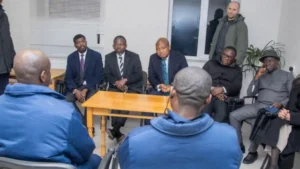The political landscape in Abia State has been thrown into turmoil following the defection of Chris Nkwonta, the representative of Ukwa East/Ukwa West Federal Constituency, from the Peoples Democratic Party (PDP) to the All Progressives Congress (APC). In response, the Abia State chapter of the PDP has called on the Independent National Electoral Commission (INEC) to declare Nkwonta’s seat vacant, claiming that his defection violates constitutional provisions.
The PDP’s request to INEC was made through a statement by Jude Ndukwe, Media Adviser to the PDP Caretaker Committee in Abia. Ndukwe emphasized that Nkwonta’s defection was illegal because it did not meet the conditions outlined in the 1999 Nigerian Constitution for a lawmaker to switch political parties.
Ndukwe pointed to Section 68(1)(g) and (2) of the 1999 Constitution, which addresses the rules surrounding defection. According to this section, a lawmaker must show that their original party is divided or facing internal conflict to justify their defection. The PDP insists that no such division exists within the party at either the state or federal level, making Nkwonta’s move to the APC unconstitutional.
“The call on INEC is for the electoral body to comply with the provisions of the Nigerian Constitution,” said Ndukwe, urging that a new election be conducted to fill Nkwonta’s seat as quickly as possible. He argued that the law must be followed to protect democratic processes, stressing that the party expects INEC to act promptly.
A key part of the PDP’s argument is that there is no internal conflict within the party to justify Nkwonta’s defection. Ndukwe clarified that PDP remains intact and strong both nationally and at the state level. Therefore, Nkwonta’s claim to have left the party due to any issues is baseless, according to PDP leaders.
Ndukwe also reiterated that Nkwonta’s defection was purely a personal decision, and no constitutional basis supports his move. The party views it as an attempt to abandon the platform that brought him into office without a legitimate reason.
On the other side of the debate, Don Ubani, a prominent PDP member from Nkwonta’s constituency and former Chief of Staff to the Governor of Abia State, came forward to defend Nkwonta’s defection. According to Ubani, Nkwonta’s decision to join the APC was not a surprise, and it had the support of key members of their constituency.
Ubani stated that the local leadership of Ukwa East and Ukwa West Federal Constituency endorsed Nkwonta’s move to the APC. He explained that the community had lost faith in the PDP and wanted stronger representation, which they believed Nkwonta could deliver by aligning with the APC.
“We mandated him to join APC,” said Ubani, arguing that Nkwonta acted in line with the wishes of the constituency. For him, Nkwonta’s defection was not an individual decision but one made in the best interests of his people. This defense shifts the conversation from legality to local political will, with Ubani suggesting that the defection was necessary for better governance in the constituency.
The defection of Chris Nkwonta raises several important questions about the legal framework governing party-switching in Nigeria. According to the Constitution, lawmakers are not free to defect at will without facing consequences, especially when no valid grounds such as party division exist. The PDP’s insistence on INEC declaring Nkwonta’s seat vacant highlights the legal challenges surrounding political defections.
If INEC complies with PDP’s request, a fresh election will be held to replace Nkwonta in the House of Representatives. This could also set a precedent for how future defections are handled in the country, particularly regarding the requirement to meet constitutional standards.
However, Ubani’s defense suggests that the conversation is not only about law but also about the political realities on the ground. If the local constituency supports Nkwonta’s move to the APC, it could reflect a growing sentiment that representatives should act in the best interests of their communities, even if it means switching parties.
The ball is now in INEC’s court to decide whether or not to declare Nkwonta’s seat vacant. If the electoral body sides with the PDP, it would trigger a new election, and Nkwonta’s political future would be uncertain. If INEC decides not to act on the PDP’s request, Nkwonta may continue his term as an APC lawmaker, representing Ukwa East and Ukwa West under his new party.
This unfolding political drama in Abia State is a reminder of the complex interplay between law, politics, and public opinion in Nigeria. Whether INEC will enforce the letter of the Constitution or consider the political dynamics in Nkwonta’s constituency remains to be seen.







